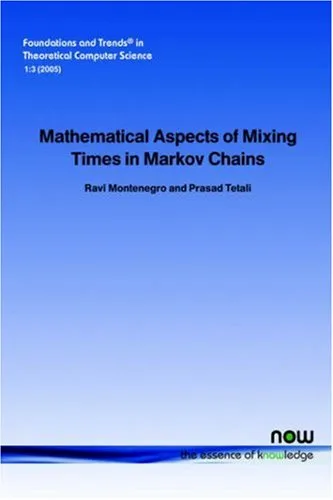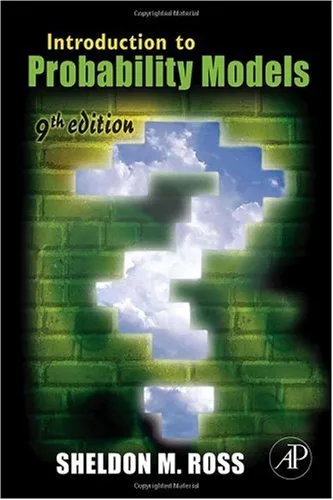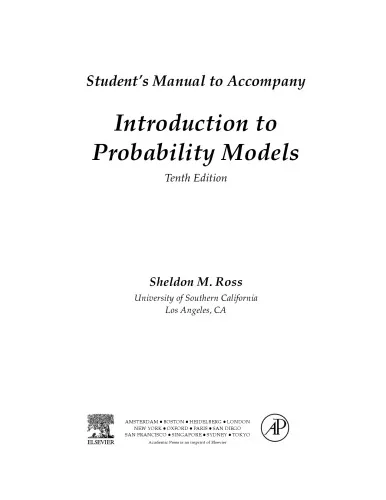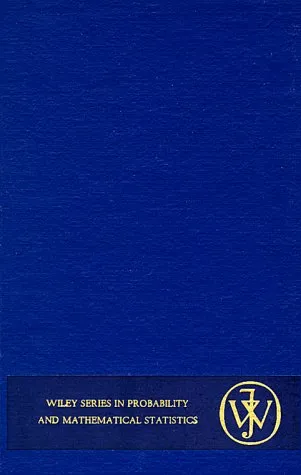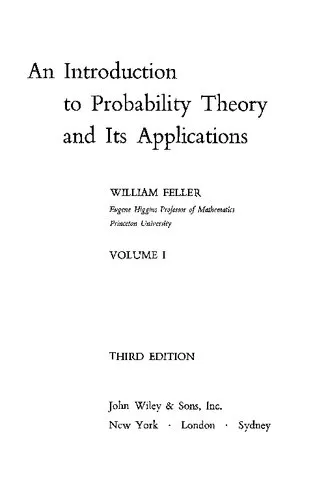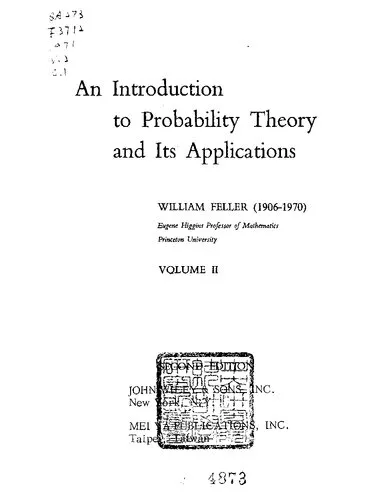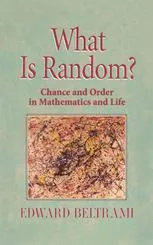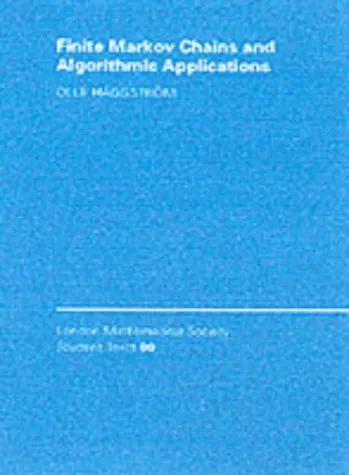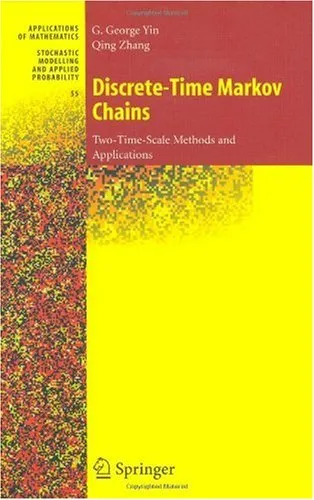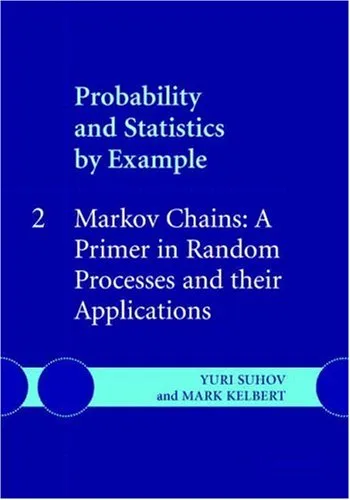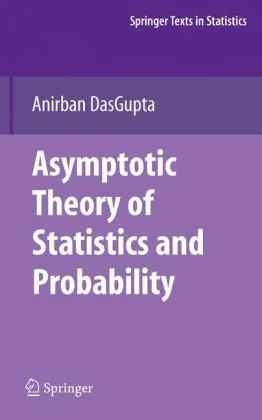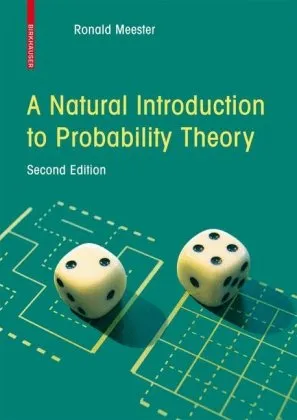Mathematical aspects of mixing times in Markov chains
4.0
بر اساس نظر کاربران

شما میتونید سوالاتتون در باره کتاب رو از هوش مصنوعیش بعد از ورود بپرسید
هر دانلود یا پرسش از هوش مصنوعی 2 امتیاز لازم دارد، برای بدست آوردن امتیاز رایگان، به صفحه ی راهنمای امتیازات سر بزنید و یک سری کار ارزشمند انجام بدینکتاب های مرتبط:
معرفی کتاب: Mathematical Aspects of Mixing Times in Markov Chains
کتاب Mathematical Aspects of Mixing Times in Markov Chains از رابی مونتنگرو و پراساد تتالی، یکی از منابع بنیادی و بسیار مهم در مورد موضوع زمانهای تزاید (Mixing Times) در زنجیرههای Markov است. این کتاب با دیدگاه ریاضی قوی، ابزارهای دقیق و کاربردهای گسترده، موضوعات مرتبط با همگرایی و رفتار زنجیرههای Markov را تحت بررسی قرار میدهد. هدف این معرفی ارائه توضیحی جامع و دستهبندی شده درباره محتوا، اهمیت و برجستگی این کتاب میباشد.
خلاصهای از کتاب
کتاب به بررسی ویژگیهای تزاید و رفتارهای همگرایی زنجیرههای Markov در زمینههای ریاضی و کاربردهای عملی میپردازد. تمرکز عمده بر یافتن محدودههایی برای زمانهای تزاید، تحلیل رفتار ایستایی زنجیرهها، و مطالعه حالات گذار است. مولفین با استفاده از ابزارهای نظریه احتمالات، آنالیز ریاضی، و Graph Theory، برای اولین بار مفهومی جامع و دقیق از زمانهای تزاید ارائه دادهاند که شامل تکنیکهایی جدید برای تخمین سرعت همگرایی است.
ساختار کتاب به سه بخش اصلی تقسیم شده است: بخش اول به مفاهیم ابتدایی و مبانی زنجیرههای Markov پرداخته، بخش دوم بر ابزارهای ریاضی (مانند spectral gaps و conductance) تمرکز کرده، و بخش سوم به مثالها و کاربردهای عملی این مفاهیم در علوم مختلف پرداخته است. تکنیکهای قدرتمند مانند Coupling، مطالعه زنجیرههای زمانی معکوس، و روشهای entropy در این کتاب توضیح داده شدهاند.
نکات کلیدی کتاب
- بررسی کامل انواع زنجیرههای Markov و رفتار زمانی آنها.
- تعریف و توضیح دقیق Mixing Times و روشهای محاسبه آن.
- تمرکز بر تکنیکهای ریاضی پیشرفته مانند Coupling و spectral analysis.
- برجسته کردن کاربردهای عملی، از جمله در علوم داده، فیزیک آماری، و الگوریتمهای تصادفی.
در کنار این نکات، کتاب شامل مثالهای بسیار متنوع و عملی از کاربرد زنجیرههای Markov در دنیای واقعی است که دامنه استفاده از این سیستمها را توضیح میدهد.
نقلقولهای معروف از کتاب
"Mixing times of Markov chains provide a fundamental link between the microscopic dynamics and the macroscopic behavior, bridging probabilistic intuitions with rigorous mathematical bounds."
"The coupling method is not just a tool; it is a lens through which the harmony of randomness can be better understood."
"Understanding the spectral gap is a journey that illuminates the profound connections between algebra and probability."
چرا این کتاب مهم است؟
کتاب Mathematical Aspects of Mixing Times in Markov Chains به دلایل متعددی یک منبع مرجع ارزشمند برای دانشجویان، پژوهشگران و متخصصان است. اولاً، این کتاب پلی میان تئوری و کاربرد است و خوانندگان را قادر میسازد تا هم اصول ریاضی را درک کنند و هم به کاربردهای عملی در زمینههای مختلف مسلط شوند. دوماً، با ارائه روشهای نوآورانه در مطالعه زنجیرههای Markov، این کتاب زمینه را برای پیشرفتهای آتی در علوم داده و هوش مصنوعی فراهم آورده است. سوماً، ساختار منظم و توضیحات شفاف کتاب باعث شده که حتی خوانندگانی که برای اولین بار با این مفاهیم مواجه میشوند، بتوانند مفاهیم اصلی را به خوبی درک کنند.
علاوه بر این، ابزارهایی که در این کتاب ارائه شدهاند، در حل طیف گستردهای از مسائل واقعی کاربرد دارند. از پیشبینیهای آماری گرفته تا تحلیل شبکههای اجتماعی، مفاهیمی که در این کتاب توضیح داده شدهاند، در سطوح مختلف کاربردی انعطافپذیری دارند.
Introduction to "Mathematical Aspects of Mixing Times in Markov Chains"
Markov chains play a central role in modern mathematics, computer science, and statistical mechanics due to their versatility in modeling stochastic processes. In our book, "Mathematical Aspects of Mixing Times in Markov Chains," we delve deeply into the mathematical foundations and techniques to analyze the behavior and rates of convergence of Markov chains to their stationary distribution (commonly referred to as the mixing time). This book serves as both a comprehensive reference and an insightful guide for researchers, practitioners, and students interested in probability theory, mathematical modeling, and algorithm design.
Detailed Summary of the Book
At its core, the book explores the mathematical principles governing mixing times, a critical concept in understanding the long-term behavior of Markov chains. Mixing time quantifies how quickly a Markov chain transitions from an arbitrary starting state toward its stationary (steady-state) distribution. While the topic has significant theoretical depth, it also has practical implications, especially in randomized algorithms, statistical sampling, physics, and machine learning.
The book begins with an introduction to Markov chains, detailing their fundamental properties, classifications, and the significance of stationary distributions. We then proceed through the theoretical underpinnings necessary to analyze mixing times, such as total variation distance, coupling methods, eigenvalues and spectral analysis, and path coupling arguments.
We cover advanced topics such as logarithmic Sobolev inequalities, entropy methods, and conductance, providing powerful tools for bounding mixing times. Additionally, we demonstrate these techniques with concrete examples from fields like card shuffling, random walks on graphs, and Gibbs sampling. These case studies effectively bridge theoretical insights with practical applications, illustrating how the mathematical principles can be employed to explore the dynamics of real-world stochastic processes.
Finally, the book surveys open problems and future directions, encouraging readers to engage with unresolved questions and advance the discipline further.
Key Takeaways
- An in-depth understanding of mixing times and their importance in Markov chain theory.
- A comprehensive toolkit, including coupling techniques, spectral methods, and conductance-based arguments, to analyze convergence rates.
- Practical guidance on applying mathematical techniques to real-world problems, supported by case studies and examples.
- Insights into advanced mathematical tools like logarithmic Sobolev inequalities and entropy arguments.
- Challenges and open problems in Markov chains, offering inspiration for further research and exploration.
Famous Quotes from the Book
"The study of mixing times is not merely an academic exercise – it directly informs how we design and analyze randomized algorithms, simulate physical processes, and solve real-world optimization problems."
"Understanding mixing time is the key to unlocking the full potential of Markov chains, transforming abstract mathematical constructs into powerful tools for science and engineering."
"In the simplicity of random processes lies the profound complexity of mathematics, and mixing times provide us with a lens to understand this interplay."
Why This Book Matters
The importance of "Mathematical Aspects of Mixing Times in Markov Chains" lies in its dual focus on theoretical rigor and practical relevance. The methods and results discussed in this book have far-reaching applications in diverse fields such as cryptography, machine learning, operations research, and statistical physics. For instance, modern Monte Carlo methods and randomized algorithms often rely critically on a deep understanding of the mixing behavior of Markov chains to ensure efficiency and reliability.
Moreover, the book empowers readers to approach stochastic processes with confidence, providing tools and insights that can be applied across disciplines. By studying the intricate patterns of convergence in seemingly random processes, readers gain an appreciation for the underlying order governing Markov chains, fostering a broader understanding of probability and its applications to the real world.
This book not only equips the reader with theoretical tools but also inspires curiosity and exploration, making it an essential resource for anyone interested in the fascinating intersection of mathematics, probability, and computation.
"Mathematical Aspects of Mixing Times in Markov Chains" is more than just a textbook – it’s a journey into the heart of randomness and mathematical convergence."
دانلود رایگان مستقیم
شما میتونید سوالاتتون در باره کتاب رو از هوش مصنوعیش بعد از ورود بپرسید
دسترسی به کتابها از طریق پلتفرمهای قانونی و کتابخانههای عمومی نه تنها از حقوق نویسندگان و ناشران حمایت میکند، بلکه به پایداری فرهنگ کتابخوانی نیز کمک میرساند. پیش از دانلود، لحظهای به بررسی این گزینهها فکر کنید.
این کتاب رو در پلتفرم های دیگه ببینید
WorldCat به شما کمک میکنه تا کتاب ها رو در کتابخانه های سراسر دنیا پیدا کنید
امتیازها، نظرات تخصصی و صحبت ها درباره کتاب را در Goodreads ببینید
کتابهای کمیاب یا دست دوم را در AbeBooks پیدا کنید و بخرید
1337
بازدید4.0
امتیاز0
نظر98%
رضایتنظرات:
4.0
بر اساس 0 نظر کاربران
Questions & Answers
Ask questions about this book or help others by answering
No questions yet. Be the first to ask!
